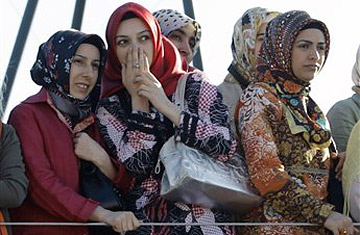
Turkish women
Turkey's pro-Islam governing party was handed a devastating legal defeat Wednesday when the country's top court ruled that a constitutional amendment to allow women in headscarves on university campuses was anti-secularist and hence unlawful.
The government of Prime Minister Recep Tayyip Erdogan pushed through the amendment in February to make it possible for pious women to attain a higher education. But the case has even greater ramifications. Turkey's secularist establishment considers the government's campaign to lift the headscarf ban as key grounds for outlawing the ruling Justice and Development Party (AKP) for its alleged Islamicizing agenda; that case will be decided in the next few months by the same Constitutional Court. A ban is being sought not just against the party but also against 71 party members, including Erdogan, who face being barred from all political activity for five years.
The idea of a court deeming a popularly elected party illegal is disconcerting to many observers, both inside and outside Turkey. But perhaps even more troublesome is the widespread feeling that the ruling was a foregone conclusion. Antagonism and mistrust has become intense between the AKP — reelected with a 47% majority last year — and secularists in the military, judiciary and main opposition party. On both sides, the debate has long since ceased to be a legal one; each sees it as crucial to the future political direction of Turkey. Few commentators doubt that the court hasn't already made up its mind about the fate of the AKP.
"The real casualty in this process has been respect for the law, and for institutions," says Hakan Altinay, director of the Open Society Institute in Turkey. In light of today's ruling, he sees only a 1% chance that the AKP might scrape through its upcoming court case. "Even if you don't agree with a court verdict, you should still be able to respect its legality. But the establishment is so busy trying to stave off what it sees as the imminent danger of political Islam, it isn't calculating the longer-term damage to our soul."
For his part, Prime Minister Erdogan, a former football player known for his famously quick temper and argumentative tone, has shown little interest in building bridges with his adversaries. His AKP hasn't debated the legal merits of the case against it, saying it is politically motivated. True as that might be, the party has also refused to do anything to allay secular concerns about its ultimate vision on what role, if any, Islam should play in the public life of a rapidly modernizing country on the cusp of Europe and Asia.
"The AKP haven't shown that they hear the concerns of women or religious minorities," says Altinay. "Even if they're banned, they will regroup under a new party banner and this trust issue will continue to haunt them until they deal with it head-on. Otherwise we'll be stuck in a time warp." Turkey has outlawed several predecessors of the AKP on similar grounds, although none of those ever enjoyed the popularity of the AKP.
By the same token, several representatives of the normally tight-lipped judiciary have recently spoken out against the government in ways that seem to flout the limits of impartiality. Neither side appears to see the real danger in Turkey's ongoing clash between political Islam and staunch secularism: that the democratic institutions the country has built up over 85 years might be irrevocably undermined. What Turkey urgently needs is to rally behind the principles of democracy, regardless of how this current saga plays out. For that to happen, both sides are going to have to learn to build a consensus together instead of clinging to inalterable principles.
